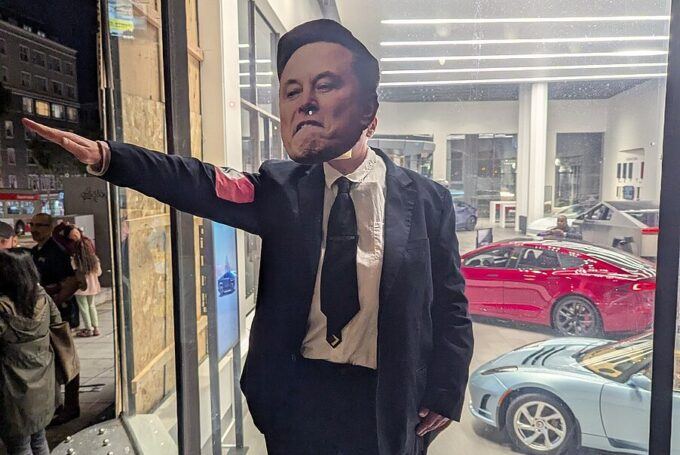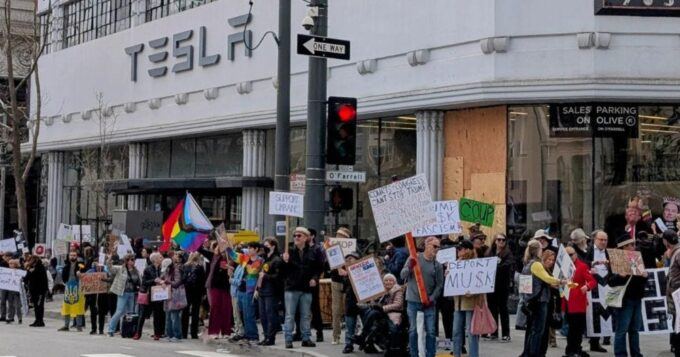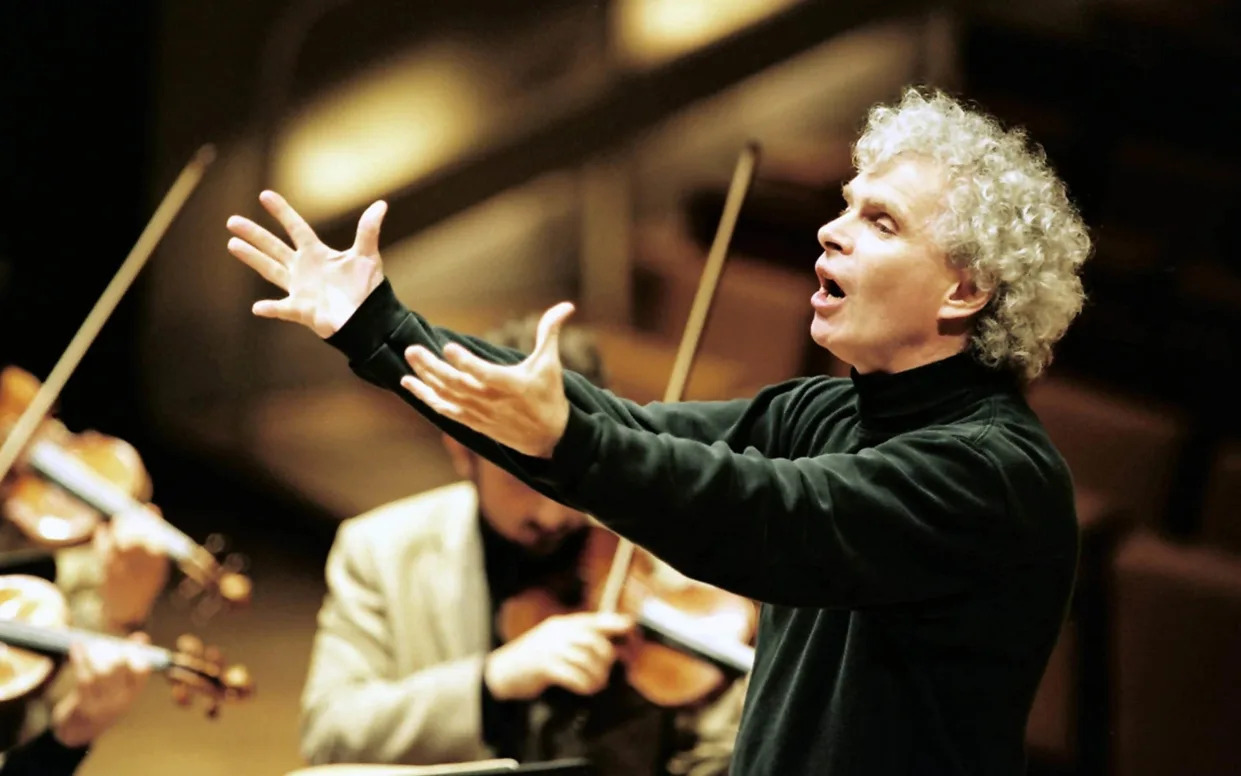
Photograph Source: Fine Apples – CC0
The challenge of separating creators from their creations is not new. However, this age-old dilemma, stretching from Nazi-favored composers to today’s politically divisive billionaires, demands practical rather than merely philosophical solutions.
Elon Musk and his multiple business ventures now stand at the center of this debate. As the world’s richest man deepens his political entanglements through controversial statements and direct government involvement, consumers worldwide face mounting pressure to align their purchasing decisions with their political values. The growing “Tesla Takedown” movement explicitly rejects the notion that Musk’s products can be divorced from his politics.
The Wagner Precedent
The case of Richard Wagner offers a historical lens through which to examine this dilemma. Wagner, who died in 1883—long before Hitler’s rise—wrote viciously antisemitic essays and was later embraced by the Nazi regime as a cultural icon. His music remains unofficially banned in Israel to this day.
In 2001, Argentine-born Israeli conductor Daniel Barenboim provoked outrage when he defied this unofficial ban by playing Wagner at Israel’s national arts festival. The incident highlighted the persistent association between Wagner’s compositions and his hateful ideology, despite the music itself containing no explicit antisemitic content.
Wagner’s case begs the question: Can artistic works transcend their creator’s repugnant beliefs? Wagner scholars continue to debate whether his antisemitism infiltrated his operas through coded caricatures. Yet Wagner’s music—the notes, harmonies, and dramatic structures—contains no inherent antisemitism.
Tesla and Musk’s Machinations
The Tesla controversy parallels Wagner’s case in important ways. The “Tesla Takedown” movement has gained momentum across both the United States and Europe, with protests at over 50 showrooms featuring slogans like “Elon Musk has got to go” and “Burn a Tesla: Save Democracy.” Some demonstrations have evolved beyond mere protest into active vandalism, with charging stations torched in Boston and suspected arson at a dealership in France.
Does a Tesla automobile embody Musk’s political activities and statements? Physically and functionally, a Tesla is simply an assemblage of metal, rubber, plastic, and software designed to transport passengers efficiently using electricity rather than fossil fuels. The car itself holds no political opinions. A Tesla car’s engineering is value-neutral.
When Separation Becomes Impossible
While Wagner’s music and Tesla’s vehicles can plausibly be distinguished from their creators, Starlink—Musk’s satellite internet service—presents a more complicated case. The service itself is technologically impressive. However, Musk’s direct operational control means customers remain vulnerable to his mercurial decision-making.
Consider Ukraine: Initially hailed as one of Ukraine’s staunchest allies, Musk deployed Starlink terminals when Russian malware crippled satellite communications across the country at the invasion’s outset. Three years later though, Musk has weaponized his social platform against President Zelensky, sharing false claims and calling for his replacement. More ominously, Musk has warned that “Ukraine’s entire front line would collapse” without Stalink’s satellite terminals—a reminder of his power to withdraw critical infrastructure during wartime potentially.
The Starlink case demonstrates that separation becomes functionally impossible when a product remains under the creator’s active control. An owner can drive their Tesla regardless of Musk’s latest post on X, but a Starlink user remains dependent on Musk’s continued goodwill.
The Control Continuum
The Starlink example reveals a crucial distinction in our age: the shift from products to services fundamentally alters the creator-creation relationship. This transformation may be the most significant factor in determining whether separation is possible.
Products like Tesla automobiles or Wagner’s recorded compositions exist independently once released into the world. A Tesla owner retains full functionality regardless of Musk’s latest controversial statement or political alliance. The vehicle, once purchased, operates autonomously from its creator’s ongoing decisions or moods. Similarly, a Wagner recording plays the same notes whether one approves of the composer’s antisemitism or not.
Services like Starlink, however, establish a perpetual dependency relationship. This product-service distinction carries profound implications as our economy increasingly shifts toward subscription-based services. Traditional product ownership allowed for a functional separation between creator and creation. Modern digital services, however, maintain persistent tethers to their creators, making separation impossible by design.
The Wagner-Musk comparison ultimately highlights how technology has fundamentally altered the terms of our ethical dilemma. When Musk controls Starlink’s satellites with the press of a button, or when social media platforms can instantly deplatform millions, creator and creation become inseparable by definition.
Perhaps the key distinction is not merely between “good” or “bad” creators but between consumption that preserves our autonomy and consumption that surrenders it. In a world of tech tycoons with unprecedented power, we must remember that market problems require market solutions. The hyper-dependence on Musk’s Starlink—with all its ethical entanglements—can only be resolved through robust competition in satellite-provided internet. We need vibrant market alternatives that prevent any single visionary—however brilliant—from accumulating too much control over critical infrastructure. The ultimate answer to the Musk dilemma is not boycotts or ethical agonizing but competing satellite networks that ensure no individual, nation, or military remains dependent on one man’s goodwill.
Marx borrows this concept to make sense of what he terms "commodity fetishism." As Marx explains, the commodity remains simple as long as it is tied to its use- ...
Georg Lukacs. History & Class Consciousness. Written: 1923;. Source: History & Class Consciousness;. Publisher: Merlin Press, 1967;. Transcribed: Andy Blunden ...
Stung by People Power Protests, Elon Musk
Targets My Group and a Close Friend
Patrick Mazza
March 18, 2025
Facebook

Photo: Indivisible.
A week ago Saturday Co-President Elon Musk took to his X platform to call out several groups staging protests against his Tesla dealerships for Musk’s Trump Administration role in slashing vital federal government functions. The Tesla Takedown movement has mounted hundreds of peaceful actions around the world. Among the groups he named were the Troublemakers, falsely claiming it is funded by ActBlue. The group has been staging protests at dealerships throughout the Seattle area, a major Tesla market, and had a key role in putting up the decentralized movement’s website, where people around the world can post upcoming actions.
I am a member of the Troublemakers, a Seattle-based group dedicated to nonviolent direct action, and was a part of our first action, one focused on forest preservation. “So Elon’s making us famous,” I thought, grimly amused but aware that being targeted in such a way could lead to consequences.
That happened quickly. The next day Musk took it to a new level, targeting Valerie Costa, a close friend and colleague with whom I have worked for years, first at 350 Seattle, and now at Troublemakers. “Costa is committing crimes,” he charged. Musk has a record of playing fast and loose with the facts, and this was another of his many lies. There have been incidents of vandalism against Tesla cars and dealerships. But Troublemakers is a strictly nonviolent group and does not endorse such actions.
The other day, Val told her story in The Guardian in a story entitled, “Elon Musk targeted me over Tesla protests. That proves our movement is working.” I’ll let Val take it from here:
“As a longtime local activist and organizer in Seattle, I’m accustomed to some conflict with powerful forces. The intention of the Tesla Takedown movement is to make a strong public stand against the tech oligarchy behind the Trump administration’s cruel and illegal actions, and to encourage Americans to sell their Teslas and dump the company’s stock. Protests like these – peaceful, locally organized, and spreading across the world – are at the heart of free speech in a democracy and a cornerstone of US political traditions. So it’s telling that the response from so-called ‘free speech absolutist’ Musk has been to single out individuals – and spread lies about us and our movement. The harassment that has followed his post has been frightening.
“It’s also proof that the Tesla Takedown campaign is working.”
Indeed, Tesla stock and sales are tanking. As of today the stock is a little under $240, half of what it was in the euphoria immediately after the election. J.P Morgan projects it to go down by half again, to $120. Meanwhile, Morgan auto analyst Ryan Brinkman last Wednesday cut his first quarter global sales estimate to 355,000, down from 440,000, and a deep plummet from 495,000 in 2024’s fourth quarter.
Clearly connecting those declines to Musk’s work with Trump and connections with Europe’s far right, Brinkman said, “We struggle to thing of anything analogous in the history of the automotive industry, in which a brand has lost so much value so quickly.”
Continuing to tell her story, Val wrote, “I am not the leader of Tesla Takedown. In fact, no one is.
“Here is the truth: Tesla Takedown is a completely decentralized movement with hundreds of protests taking place around the globe, drawing many thousands of people out of their homes and onto the public sidewalks to stand up for programs that support poor people, older people, veterans, the sick. Out of care and concern for others – a foreign concept to those currently in power – people are offering what they can to help. I’ve offered to schlep supplies, and helped someone find a bullhorn. The environmentally focused Seattle organization I’m a part of, Troublemakers, hosts a map where other people and groups can post the locations of forthcoming demonstrations. Troublemakers has about $3,500 in its bank accounts. All of this is a bare-bones, low-budget, people-powered movement – which is exactly why Musk is afraid of it, and casting about to find a villain.”
Val then hit the crux of the issue.
“If we can’t show our opposition to what the government is doing, we are living in a dictatorship. If we are criminalized for calling out the rich and powerful for their illegal actions, that is a dictatorship. I don’t want to live in a dictatorship.
“Make no mistake, it’s scary to be personally called out by the richest man in the world on the platform he owns. It’s scary to be targeted by a seemingly endless number of his devoted trolls and bots. To be doxxed, to have one’s life pored over and exposed, to be smeared, attacked and falsely accused. It’s scarier still when the FBI director gets tagged into the threads and asked to investigate. But I’m not backing down – and even if I did, it wouldn’t make a dent in this movement. Hundreds if not thousands of people have participated in the ways that I have.
“The truth is, the people are powerful. I’ve always believed that. And now we know that Elon Musk does too.”
Val also told her story on Democracy Now.
Val Costa has acknowledged how terrifying it is to be targeted by the world’s richest man (though he may be knocked off that perch soon). But, no surprise to me, she has continued to stand and speak out with courage. Val has been on many direct action frontlines, and is deeply committed to environmental and social justice in all its forms. Knowing Val, Musk’s attack has only made he more pissed off than she was before. Bravo Val!
We who work in movements have known the second Trump Administration would bring an elevated level of uncertainty and risk. But that isn’t stopping us. As Franklin Roosevelt said, “Courage is not the absence of fear, but rather the assessment that something else is more important than fear.” With so much at stake now, there are obviously many things more important than fear. Relatedly, Nelson Mandela said, “I learned that courage was not the absence of fear, but the triumph over it.” Valerie Costa is setting an example of triumph for all of us. One which we will need in coming years as we fight for what is dear to us against oligarchic monstrosities like Elon Musk.
This first appeared in The Raven.





